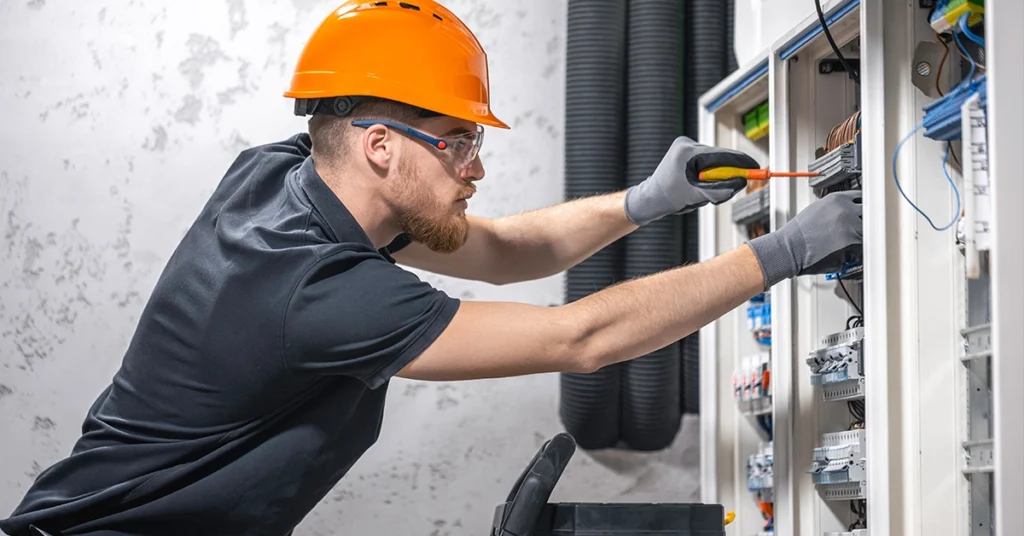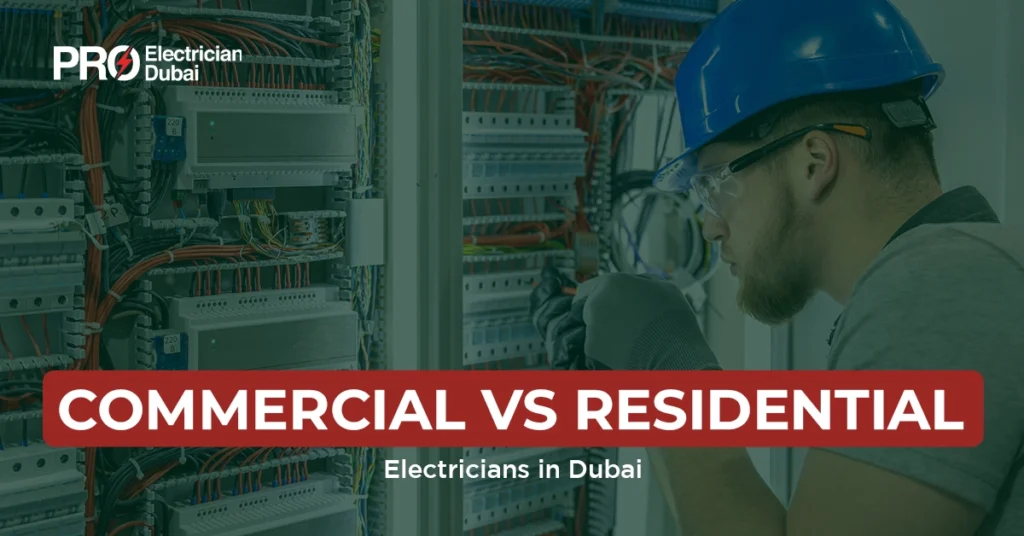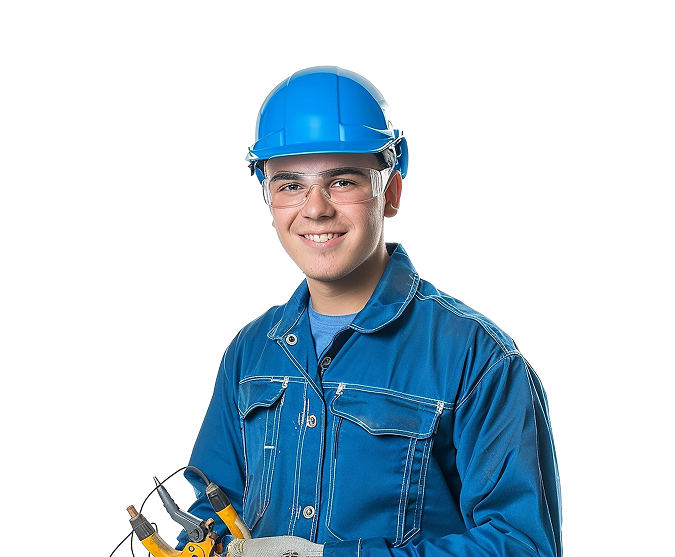When you’re looking for a trusted electrician in Dubai, one of the first questions to answer is whether you need a commercial electrician or a residential electrician. The distinction is not just about where they work, but about the type of systems, power requirements, certifications, and safety standards they are trained to handle.
At Pro Electrician Dubai, we have specialized teams for both residential and commercial projects. With over two decades of on-the-ground experience, I can tell you firsthand that choosing the right electrician for your property is critical. Hiring the wrong type may lead to safety risks, costly rework, or code violations.
In this guide, I’ll explain the difference between commercial and residential electricians in Dubai, the scope of their work, and how to choose the right professional for your project.
What is a Residential Electrician in Dubai?
A residential electrician focuses on homes, villas, and apartments across Dubai. Their work revolves around ensuring safe and reliable electrical systems for daily household use.
Scope of Work
- Home wiring installation and upgrades
- Lighting systems for villas and apartments
- Smart home integrations (automated lighting, security, climate control)
- Outlet and switch repairs
- Ceiling fan and appliance installations
- Emergency home electrical repair services
Power & Systems
- Typically handle single-phase systems between 220–240 volts, standard for homes in Dubai
- Work with lower load requirements suitable for everyday household appliances
Certifications & Compliance
- Must be a licensed electrician in Dubai with knowledge of DEWA (Dubai Electricity and Water Authority) regulations
- Familiar with the Dubai Building Code specific to residential electrical installations
If your project involves a villa rewiring, apartment repair, or smart home setup, a residential electrician is the right choice.
What is a Commercial Electrician in Dubai?
A commercial electrician specializes in electrical systems for offices, retail shops, restaurants, warehouses, and high-rise buildings. Their work is broader, more complex, and often involves larger power distribution networks.
Scope of Work
- Office electrical installations and rewiring
- Power distribution for retail stores and restaurants
- Lighting design and emergency backup systems for commercial spaces
- Electrical maintenance contracts for businesses
- Industrial and warehouse electrical work
- Compliance upgrades for Dubai Municipality inspections
Power & Systems
- Handle three-phase systems, which supply higher voltage and more power than residential setups
- Manage large-scale electrical loads, often supporting heavy equipment, escalators, or central air conditioning
Certifications & Compliance
- Must be a certified commercial electrician in Dubai with knowledge of Dubai Civil Defense codes, DEWA approval processes, and international safety standards
- Experience working on complex blueprints and coordinating with architects, contractors, and project managers
If you’re planning a new office electrical setup or need electrical contractors for commercial buildings in Dubai, a commercial electrician is essential.
Key Differences Between Commercial and Residential Electricians in Dubai
Understanding commercial vs residential electricians in Dubai is important before hiring. Here are the main differences:
1. Power Requirements
- Residential: Single-phase, 220–240 volts
- Commercial: Three-phase, higher voltages for large systems
2. Complexity
- Residential projects are often repetitive but straightforward
- Commercial projects involve larger infrastructures and require specialized planning
3. Codes and Safety Standards
- Residential electricians focus on home compliance and DEWA guidelines
- Commercial electricians deal with stricter codes, fire safety systems, and heavy load management
4. Equipment & Tools
- Residential: Standard hand tools and testing devices
- Commercial: Advanced diagnostic tools, industrial-grade wiring, heavy-duty breakers
5. Training & Licensing
- Residential: Trained for domestic environments
- Commercial: Require specialized training for industrial-grade systems and certifications for office and warehouse projects
Can a Residential Electrician Work on Commercial Buildings in Dubai?
The short answer is no. A residential electrician may not have the training, equipment, or licensing required for commercial projects. In Dubai, only certified commercial electricians can handle three-phase wiring, high-voltage systems, and commercial code compliance.
Hiring the wrong professional can lead to:
- Failed inspections by Dubai Municipality
- Risk of electrical fires
- Business downtime due to system overloads
- Expensive rework and penalties

How to Choose Between a Residential and Commercial Electrician in Dubai
When deciding who to hire, consider:
- Type of Property: Villa, apartment, or office?
- Scope of Work: Simple rewiring or full-scale power distribution?
- Power Needs: Domestic appliances vs heavy-duty equipment?
- Compliance: Does your project need Dubai Municipality approval?
For instance, if you’re a homeowner in Downtown Dubai needing a home wiring specialist, hire a residential electrician. But if you’re a business setting up an office in Business Bay, you’ll need an experienced commercial electrician who understands office electrical systems and compliance.
For larger projects, you may also need an electrical contractor in Dubai to manage multiple electricians and coordinate inspections.
Local Expertise Matters
Dubai has unique requirements compared to other regions:
- Extreme heat affects cabling and insulation choices
- High-rise buildings demand specific load distribution planning
- Villas and luxury homes often require smart home systems
- Businesses must comply with Dubai Civil Defense fire safety standards
At Pro Electrician Dubai, we have teams dedicated to both residential and commercial electrical services, ensuring projects are handled with the right expertise.
For example, we recently provided electrical maintenance for a commercial property in Dubai Marina, ensuring uninterrupted power for a retail business. On the residential side, we rewired a villa in Jumeirah with energy-efficient lighting and smart controls.
Conclusion: Choosing the Right Electrician Saves Time and Money
The difference between residential vs commercial electricians in Dubai comes down to specialization. Residential electricians keep homes safe and functional, while commercial electricians ensure businesses operate smoothly and meet strict compliance requirements.
Hiring the right professional means your project is done safely, on time, and in line with Dubai’s regulations.
If you’re unsure which type you need, contact Pro Electrician Dubai for guidance. Whether it’s a villa wiring project or a commercial electrical setup in Business Bay, we’ll match you with the right expert.
Explore our full range of electrical services in Dubai for more details.
Frequently Asked Questions
What’s the difference between commercial and residential electricians in Dubai?
Residential electricians handle homes and apartments with single-phase systems, while commercial electricians manage high-power, three-phase systems for offices, shops, and warehouses.
Can a residential electrician work on a commercial project?
No. Commercial projects require certified commercial electricians who can handle complex codes, higher power loads, and specialized equipment.
How do I know which electrician to hire?
Decide based on your property type and project scope. For apartments, villas, and homes, hire a residential electrician. For offices, warehouses, and retail spaces, hire a commercial electrician.
Do electricians in Dubai need to be licensed?
Yes. Both residential and commercial electricians must be licensed in Dubai and follow DEWA regulations and Dubai Municipality codes.
Who is the best electrician for office buildings in Dubai?
Look for an experienced commercial electrician Dubai company, like Pro Electrician Dubai, with proven projects and compliance knowledge.


